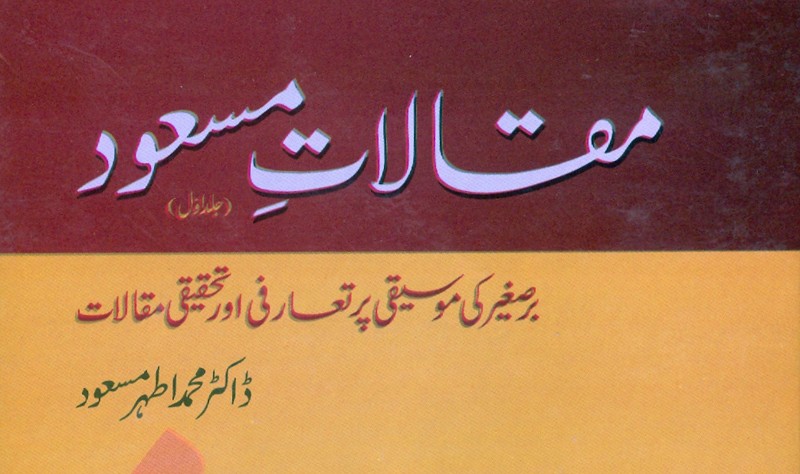
A valuable book on music scholarship by Dr Muhammad Athar Masood

Athar Masood is a scholar of Persian. For his doctoral dissertation he selected at the Oriental College an unlikely subject Barr e Sagheer Key Ghanai Fanoon Per Faarsi Tasaneef Ka Tanqeedi Jaiza and defended it successfully. From time to time he has been writing about the issues and problems relating to music scholarship particularly in our region. Now, after many a decade, he has compiled some of those articles in a book form and calls it Volume 1. This means there are more volumes to follow of such writings.
In the last thousand years or so, civilization in India too developed on parallel lines while merging at some points. Parallel development was considered necessary to keep the religions pure and the ruling classes distinct, but some of it was the result of difficulties that were not readily surmountable. Most of the people did not know both Persian and Sanskrit. Those who knew Persian tapped into its sources and those who knew Sanskrit dipped into its pool and insisted on the continuous and unbroken tradition in their respective areas. The scholarship of music too suffered on account of this parallel development and musicologists did not bother to find out what was written in the text of the language that they did not know.
The practice of music was influenced by myriad sources and in the process of its evolution also acquired, assimilated and created a new expression for itself. The North Indian Music or Hindustani Music became distinct from Carnatic Music. Musicologists, probably in retrospect, went about exploring the influence of Persian, Arabic and other Central Asian sources in finding the reason for this distinction. They approached it with an open mind but during the run up to independence and then the creation of two countries in the twentieth century, two different approaches in musicology were instituted.
In India, the influence of sources from outside the subcontinent were either ignored or downrightly castigated for artistic corruption. In Pakistan, unfortunately, the debate about the legitimacy of music and the controversial attitude towards the arts in general and the performing arts in particular left the field wide open for others to play according to their own rules. Forced by this pressure, some who picked up the gauntlet became apologists and took a 180 degree turn. They attributed everything to outside sources and called it the kiss of resuscitation for the dying local music.
But there were unbiased valiant individuals, too, who persisted in doing selfless work. One person among such who did plenty of research and serious thinking in music scholarship was Rashid Malik. He was a serious scholar of music as is evident from the various writings that he has left behind. Most of these are either in book form or in the shape of extended essays. This means that he debated the issue at length and extensively but he also wrote for the layman. Some of his writings for newspapers have been collected as well.
Athar Masood has been emulating Rashid Malik and, besides editing some of Malik’s writings and publishing them, he has acknowledged being inspired by his diligence and approach in his pursuit of music scholarship. Many western musicologists have been deeply involved in the same pursuit and some have taken the position of looking into the influence of Indian music on the music of the Persians. This two-way exchange and flow of music ideas further cleared the fog that may have seemed impenetrable at first glance.
One such person is F. Delvoye, a French scholar and some of his work has been consulted particularly "Indo Persian Literature on Art Music-Some Historical and Technical Aspects" and "Confluences of Cultures".
As it was, music scholarship usually took place in isolation from what was happening in society at large and the other forms of art. Actually in India all the art forms, being very stylised, seemed to have developed in isolation from each other in varying degrees. Another characteristic was the blurring of boundaries between the original text and its interpretation. Many a scholar and musicologist took up a known text but, instead of identifying where the original text ended and the interpretation began, let the lines remain fluid which has created a lot of confusion for later researchers. At the same time it was quite common to take up the text for example in Sanskrit and translate that into Persian without acknowledgement and references. That too has created plenty of confusion.
Though the collection of articles in a book form does not hold the same pristine value as an ordinal work, it is always handy to have a number of them in one volume. It is easier to read and to consult and, in a way, trace the consistency of thought of the writer. The subsequent volumes will be of value because very little has been written about music and its scholarship as most people see it as a performing art which should be left at that.